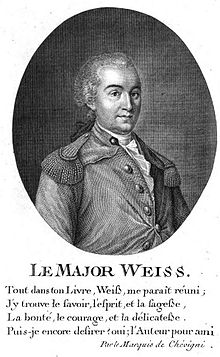François-Rodolphe de Weiss

François-Rodolphe de Weiss (von Weiss, also von Weiß, surname at birth Wyss) (1751–1818) was a Swiss military officer, diplomat, writer, philosopher, and a follower of Jean-Jacques Rousseau.
Life
[edit]He was born at Yverdon, son of François Rodolphe, seigneur de Daillens, and Henriette Russillon. He entered French military service in 1766, and Prussian in 1777. In 1785 he became a member of the Grand Conseil at Bern.[1]
A supporter of the ideas of the French Revolution, de Weiss was sent to Paris as an envoy in 1792, and maintained a peace between France and the Swiss confederation.[1] In 1794 he attributed the Revolution to ideas emanating from Geneva.[2]
In 1798 the Bernese bailiwick at Lucens Castle was ended by a popular uprising, with Weiss defending the castle.[3]
Weiss then went into exile, in Germany. He died by suicide at Coppet on 21 July 1818.[1]
Works
[edit]- Principes philosophiques, politiques et moraux, 2 vol. (1785). A successful work of philosophy in the style of the 18th century, translated into German and English.[4]
- Réveillez-vous Suisses, le danger approche (1798), Lyon, Imprimerie Franoy. This work was published in January 1798 during the Diet of Aarau, called to consider political reform.[5]
Notes
[edit]- ^ a b c "Weiss, François Rodolphe de, Dictionnaire historique de la Suisse". Retrieved 9 June 2016.
- ^ Richard Whatmore (31 July 2012). Against War and Empire: Geneva, Britain, and France in the Eighteenth Century. Yale University Press. p. 102. ISBN 978-0-300-17557-8.
- ^ "History, Château de Lucens". Retrieved 30 January 2017.
- ^ fr:s:Biographie universelle ancienne et moderne/2e éd., 1843/WEISS (François-Rodolphe)
- ^ Broussy, Antoine (2011). "Rethinking Republicanism in Switzerland during 1798–1801". La Révolution Française. doi:10.4000/lrf.344. S2CID 194393820. Retrieved 10 June 2016.
